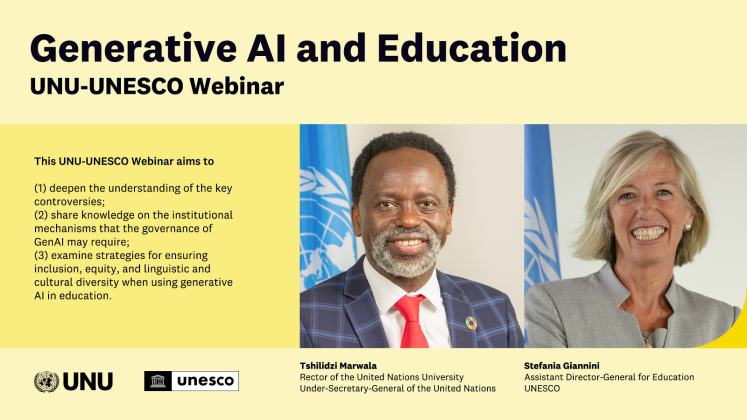The emergence of publicly available generative Artificial Intelligence (GenAI) models has profound and multi-faceted legal and ethical implications across sectors and has also triggered the acceleration of regulation responses from the United States, Europe and China. During the first edition of Digital Learning Week in September 2023, UNESCO released the Guidance for generative AI in education and research which outlines the social and ethical concerns associated with AI systems around eight fundamental controversies and proposes recommendations for the regulation of generative AI tools, and foundation models in particular, and their uses in education.
The webinar is designed around the UNESCO Guidance for generative AI in education and research. The objectives are to: (1) deepen the understanding of the key controversies; (2) share knowledge on the institutional mechanisms that the governance of GenAI may require; and (3) examine strategies for ensuring inclusion, equity, and linguistic and cultural diversity when using generative AI in education.
Date and time
9 April 2024
9:30 – 11:00 (CET); 15:30 - 17:00 (Beijing)
Agenda
Programme | |
9:30 – 9:50 (20’) |
Introduction to the Webinar Series Ms Jingbo Huang, Director of United Nations University Institute in Macau (UNU Macau) Introduction Mr Sobhi Tawil, Director, Future of Learning and Innovation, UNESCO Opening Remarks § Mr Tshilidzi Marwala, Rector of the United Nations University, Under-Secretary-General of the United Nations § Ms Stefania Giannini, Assistant Director-General for Education, UNESCO |
9:50 – 10:05 (15’) |
Moderator: Ms Jingbo Huang, Director of United Nations University Institute in Macau (UNU Macau) Guidance for Generative AI in Education and Research Mr Fengchun Miao, Chief, Unit for Technology and AI in Education, Future of Learning and Innovation, UNESCO |
10:05 – 10:50 (45’) |
Panel Discussion § Ms Lidija Kralj, Education Analyst & Adviser, EduConLink, Croatia § Mr Mark Ray, Director, Department of Education Services, Cayman Islands § Mr Antonio Saravanos, Associate Professor of Information Systems Management, New York University, USA § Stephen Ta'Bois – STEM Specialist, Department of Education Services, Cayman Islands |
10:50 – 11:00 (10’) |
Closing Remarks Mr Sobhi Tawil, Director, Future of Learning and Innovation, UNESCO |



